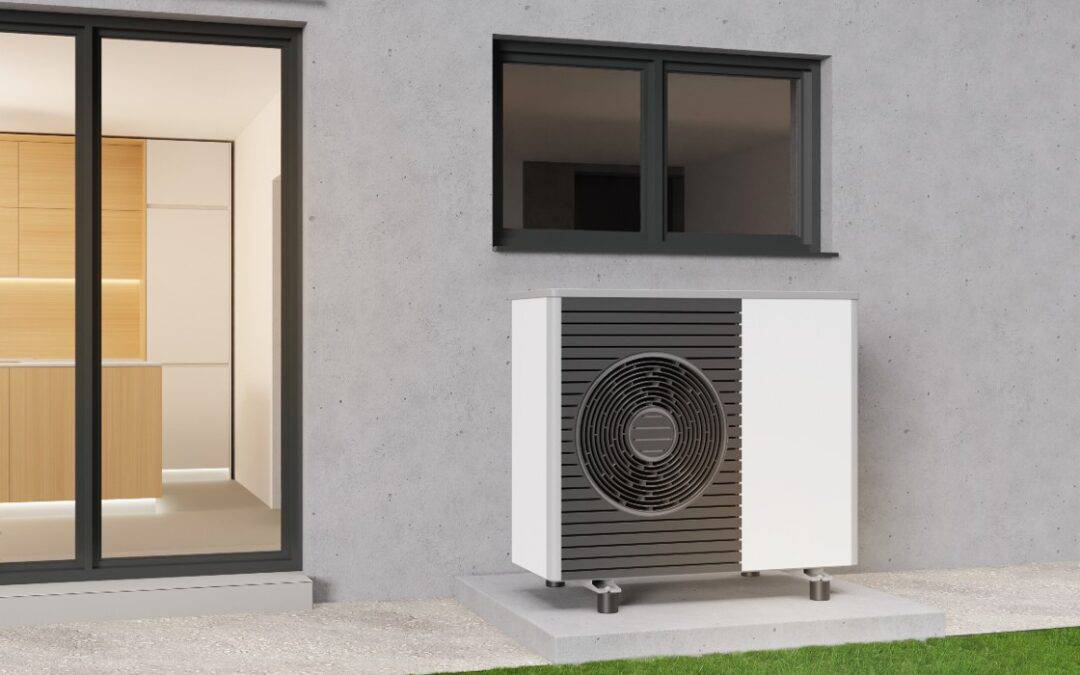Heat pumps are growing quickly in popularity as a sustainable, low-carbon and energy-efficient way to warm homes and provide hot water, but we often speak with homeowners unsure whether an air source heat pump installation is a possible solution for their property.
Many assume that heat pumps are only available for large, detached properties and houses rather than apartments or that a heat pump will only work properly in a new build with modern insulation and energy conservation installations.
While several factors will affect the efficiency of an air source heat pump, they remain a versatile heating solution compatible with almost every type and age of housing, as verified by the Energy Saving Trust.
How Do Air Source Heat Pumps Work?
Heat pumps use technology that absorbs environmental heat year-round, extracting energy from the air even during colder weather, and using electricity to convert it into heat outputs inside the home.
The outdoor air source heat pump unit draws air into a set of tubes containing refrigerating gases, which circulate at very cold temperatures. The gas moves through a compressor which uses pressure to change cold gas into hot liquid, which then passes into a heat exchanger, warming the water for your central heating system and hot water taps.
Where space is limited, air source heat pumps are preferable to ground source pumps since the latter has a much bigger unit size better suited to larger homes with higher demands for heating capacity.
Energy Efficiency Updates and Air Source Heat Pump Installation
Air source heat pump installation in a recently built property with good insulation means the pump will work more efficiently; heat pumps can still be feasible for older homes, extracting the external heat energy in the air and transforming it into internal heating.
Air source heat pumps are linked with other energy-efficiency improvements because a heat pump doesn’t work like a gas or oil heating system and, therefore, can’t provide rapid heating or hot water on demand.
Instead, the heat pump delivers heat slowly, building up to the required temperature.
Adding insulation to the building helps ensure the heat doesn’t escape just as fast as the heat pump generates it, and we can organise a site survey to provide independent advice about which energy-saving measures will make any property better suited to an air source heat pump.
Older properties may benefit from the following:
- Upgraded insulation to retain heat for longer and reduce the cost of heating.
- Modern pipes and ducting, which form an important part of the internal system.
- Larger and more radiators, which release heat effectively across the home.
Many homeowners also fit underfloor heating, which works well with an air source heat pump installation. The larger surface area releases heat more effectively, much like bigger radiators are a great way to maximise the heat production generated by a heat pump.
Space Requirements for an Air Source Heat Pump Installation
In contrast to a ground source heat pump, an air source solution requires less space, which is why they are suited to such a broad array of properties. However, a more powerful heat pump unit may benefit properties of much older construction or with lower-quality heating and insulation.
In terms of sizing and space, you can install an air source heat pump anywhere outside that has sufficient air circulation and is easy to access – renewable heating engineers will also look at exposure to high winds and the amount of time the unit will be exposed to direct sunlight.
Different heat pumps have different manufacturer installation guidelines, but you will usually need:
- Space on a wall or the ground with enough airflow.
- Proximity to a suitable power source.
- Protection from strong winds and prolonged sunlight.
- An installation location that will not cause noise disturbances.
Monobloc air source heat pumps comprise one larger unit and need more space outside. In contrast, split systems have a smaller external unit combined with an indoor unit, so an engineer can recommend the best solutions depending on your property, capacity inside and outside, the size of the home, and your expectations in terms of average temperatures.
Homeowners can fit heat pumps in varied locations, and in some cases, an open enclosure is ideal to ensure the airflow cannot be interrupted.
What to Consider When Installing an Air Source Heat Pump
Air source heat pumps can be fitted on almost any property, whether wall-mounted outside an apartment or placed at ground level. Installers can also evaluate your existing pipework to identify the best place to install your air source heat pump to minimise the amount of piping or ducting requirement.
Fixing the unit at ground level can be preferable since it is easier to access for maintenance purposes. Still, if you do not have ground floor space, fixing a unit to the wall with brackets is possible.
Ideally, the heat pump should be exposed to open air rather than concealed inside a shed or other structure since the pump draws in air through three sides, extracting ambient heat and releasing cold air from the front of the unit.
Therefore, most manufacturers will dictate a minimum amount of open space that should be kept clear in front of the heat pump to ensure it works properly.
Planning Permission for Air Source Heat Pump Installation
In most cases, you won’t need planning permission to fit an air source heat pump since the unit is relatively small and falls under the remit of permitted development.
Exceptions apply, such as when fitting air source heat pumps on pitched roofs, in conservation areas, and if you wish to install a larger heat pump that is either bigger than 0.6 cubic metres or fitted within one metre of your property boundary.
If you would like further advice about upgrading your home heating system to an air source heat pump, guidance on the energy-saving measures that would boost the efficiency of a sustainable heating system or suggestions on the ideal placements, please get in touch with the renewable energy heat pump installers specialists at Gas Worx.







